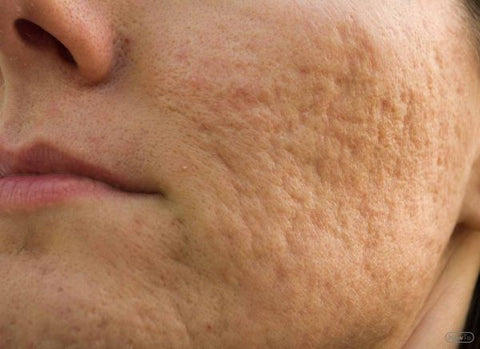How To Get Rid Of Acne Scars?
Acne scars can be a frustrating consequence of acne breakouts. You've already had to deal with those annoying pimples and now they have gone but been replaced by acne marks.
So what can you do to get rid of the acne marks? Read on to find out.
The Different Types Of Acne Scars
In order to move forward with the best plan of action, you first need to understand what type of acne scars you have as they all need slightly different approaches. Lets break the most common types down one at a time and explore what to do.
Post Inflammatory Hyperpigmentation

This is where your skin develops darker patches than the normal surrounding areas. It happens when the skin produces excess melanin and occurs more frequently in darker skin tones.
It's more likely to happen if you pick at or squeeze your pimples so try to avoid the temptation.
The good news is that these patches are likely to turn back to your skin's normal colour over time following post inflammatory hyperpigmentation, but there are some things that can be used topically that will help the process.
Treatment For Post Inflammatory Hyperpigmentation
- Sunscreen - protects against UV rays stimulating melanin production
- Retinoids - to help increase cell turnover and inhibit the production of melanin
- Vitamin C - to increase synthesis of collagen
- Niacinamide - to help stabilize melanin production
- Hydroquinone - bleaches skin and decreases melanocytes
- Alpha Arbutin - to help inhibit melanin production
- Licorice extract - inhibits melanin biosynthesis
- Kojic acid - inhibits the production of excess pigment
- Tranexamic acid - to help inhibit pigment transfer
The best combination of ingredients to use may differ from person to person, but if you are confused about where to begin and don't have access to medical expertise then sunscreen (crucial), retinoids and vitamin C are a good place to start.
It's also always a good idea to visit a dermatologist as they are extensively trained to help with your skin concerns and there are some additional treatments they can offer like laser therapy, professional chemical peels and prescription strength retinoids or hydroquinone.
Post Inflammatory Erythema

These look like little red or pink spots on the skin and are caused by damage to the capillaries near the skin's surface or blood vessel dilation.
Treating Post Inflammatory Erythema
Although frustrating, post inflammatory erythema will likely go away on its own over time. Patience may be needed though as this can take up to 6 months.
You can help to speed up the process with good topical products that contain vitamin C, retinol/retinoids and niacinamide. You can also look at professional laser or micro-needling although they are not likely to be necessary.
Hypertrophic Acne Scars

These are raised sections of scar tissue and they form in the same place as your acne was. They are usually the same size as the originally acne, but keloid scars can grow larger.
Treating Hypertrophic Acne Scars
Although retinoids can give some benefit to all forms of acne scars, you are really likely to need professional medical support if you want to get rid of hypertrophic or keloid scars.
Visit your doctor or dermatologist to talk you through treatment options that may include:
- Steroid injections
- Topical steroids
- Silicone gel dressings
- Cryotherapy
- Surgical removal
Atrophic Acne Scars

These type of acne scars create small divots in the skin's surface due to the skin not regenerating tissue properly.
There are 3 sub-types of atrophic acne scars:
- Ice pick scars - deep and narrow scars that are the most severe
- Rolling scars - little pits in the skin, usually with sloped sides
- Box car scars - small craters the skin usually with vertical edges
Treating Atrophic Acne Scars
Each sub type of atrophic acne scar may need a different approach, and whilst retinoids will help, over the counter topical treatments are very unlikely to be enough. You are going to need professional support, ideally from a dermatologist.
Some of the treatment options that a dermatologist may explore with you include:
- Chemical peels
- Fillers
- Microneedling
- Laser
- Punch excision
- Subcision
We hope this post has been useful to help you understand more about how to tackle those acne marks. Acne scars are frustrating but the right approach and professional support can help to clear or at least visibly improve your skin.
Have you checked out our premium men's skincare range yet?
Help prevent acne and acne scars with key active ingredients, vitamins and antioxidants for healthy, clear skin.





